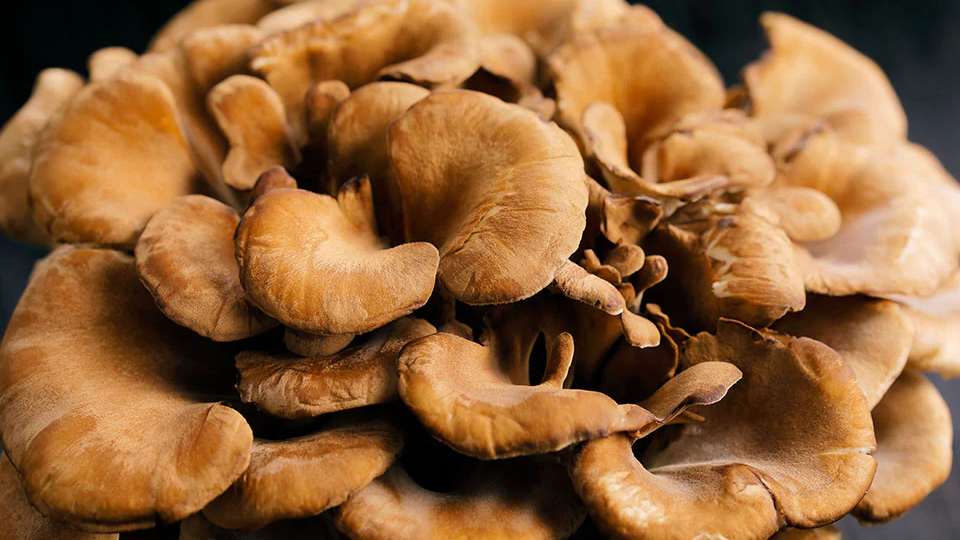Maitake Mushroom Benefits – All You Should Know
Maitake mushrooms have a rich history as both culinary and medicinal treasures. The name “maitake” originates from its Japanese name, translating to “dancing mushroom.” It’s said that people danced with joy upon discovering its potent healing abilities. This mushroom is not just delicious and packed with nutrients, but it also offers remarkable health benefits, including supporting healthy blood sugar levels and immune health.
In recent times, the maitake mushroom has attracted global attention due to emerging research revealing its numerous health-promoting properties. This is largely due to D-fraction, a specific compound from the maitake mushroom, known for therapeutic effects in cancer patients.
Wondering what are maitake mushroom benefits and how to include it in your daily routine? Here are its history background, benefits, nutrition facts, and tips for daily consumption.
In this article:
What Are Maitake Mushrooms?
Maitake mushrooms, scientifically known as Grifola frondosa, also referred to as “hen of the woods,” are known for their distinct appearance and captivating flavor.
Maitake mushrooms grow in clusters, featuring overlapping fronds that resemble the plumage of a fluffed hen, sometimes growing over 100 pounds, earning them the title “king of the mushrooms.” With a rich earthy aroma, they have become a sought-after ingredient in culinary endeavors worldwide. These mushrooms are native to the mountainous regions of northeastern Japan and North America.
This special food boasts a distinctive frilly look, a tender texture, and an earthy taste that complements a variety of dishes, including burgers and stir-fries. Like oyster mushrooms, it’s a common choice in Japanese cooking, but its popularity is quickly spreading worldwide.
Maitake Mushrooms Health Benefits
Maitake mushrooms have long been prized for their potential health benefits, supported by both traditional wisdom and scientific research.
9 Incredible Benefits
1. Immune System Support
Maitake mushrooms possess remarkable immunomodulatory properties that not only strengthen but also balance the immune system. Notably, they contain a unique polysaccharide called beta-glucan, which stimulates the activity of immune cells, such as natural killer (NK) cells and macrophages. By doing so, Maitake mushrooms enhance the body’s ability to defend against pathogens and foreign substances. Additionally, studies have suggested that Maitake mushroom extracts may have significant immunostimulatory effects, contributing to overall immune health[1].
2. Antioxidant and Anti-inflammatory Effects
Maitake mushrooms contain a variety of bioactive compounds, including antioxidants and anti-inflammatory agents. These substances help protect cells from oxidative stress and inflammation, which are underlying factors in many chronic diseases. By neutralizing harmful free radicals and reducing inflammation, Maitake mushrooms contribute to maintaining overall health and well-being.
3. Blood Sugar Regulation
According to research, Maitake mushrooms may have a positive impact on blood sugar levels. Specifically, certain compounds found in Maitake mushrooms, such as alpha-glucans, have been shown to enhance insulin sensitivity and improve glucose metabolism. Consequently, these effects can be particularly beneficial for individuals with diabetes or those at risk of developing the condition.[2].

4. Cardiovascular Health
Regular consumption of Maitake mushrooms may support cardiovascular health. The mushroom’s bioactive components, including beta-glucans, have been associated with cholesterol-lowering effects and the prevention of arterial plaque formation. By promoting healthy lipid profiles and reducing the risk of cardiovascular diseases, Maitake mushrooms contribute to a healthy heart.
5. Weight Management
Maitake mushrooms are low in calories and fat while providing essential nutrients. Their high fiber content helps promote satiety, making them a beneficial addition to a weight management plan. Additionally, Maitake mushrooms possess compounds that may aid in fat metabolism, potentially supporting healthy weight loss[3].
6. May Have Anti-Cancer Properties
Research has indicated that Maitake mushrooms possess potential anti-cancer activity. Moreover, scientists have discovered that extracts from Maitake mushrooms can potentially slow down tumor growth by activating immune cells responsible for inhibiting the growth of cancer cells. These immune cells include natural killer cells and T-cells. Additionally, Maitake mushrooms contain a compound called D-fraction within the beta-glucan, which is believed to exhibit anti-tumor properties[4].
However, further research, including controlled clinical trials, is required to gain a deeper understanding of these effects and their efficacy.
Traditional Benefits of Maitake Mushrooms

East Asian cultures have a long-standing tradition of using Maitake mushrooms for their medicinal properties. These mushrooms were highly valued for their potential to support the immune system, promote overall well-being, and maintain optimal health. Moreover, traditional herbalists relied on Maitake mushrooms as a natural remedy for various ailments, including immune-related disorders, hypertension, and diabetes.
In both traditional Japanese and Chinese medicine, Maitake mushrooms played a prominent role. They were incorporated into herbal remedies and tonics, aimed at enhancing overall health and vitality. Notably, these mushrooms were particularly revered for their immune-boosting properties and their ability to support cardiovascular health.
Maitake Benefits for Skin
Apart from their internal health benefits, Maitake mushrooms also offer advantages for the skin and make them a valuable addition to skincare routines[5].
- Nourishment and Hydration: The active compounds present in Maitake mushrooms help to hydrate and nourish the skin, promoting a healthy and youthful appearance. They work to improve skin elasticity and moisture retention, reducing the signs of dryness and providing a natural glow.
- Anti-Aging Properties: Maitake mushrooms are rich in antioxidants that help combat free radicals, which can accelerate the aging process and lead to wrinkles, fine lines, and dull skin. Regular use of Maitake-infused skincare products can help minimize the appearance of aging signs, promoting a more youthful complexion.
- Skin Brightening: The natural compounds found in Maitake mushrooms can help even out skin tone and promote a brighter complexion. They assist in reducing the appearance of dark spots, hyperpigmentation, and discoloration, resulting in a more radiant and luminous skin tone.
- Soothing and Calming Effects: Maitake mushrooms possess anti-inflammatory properties that can help soothe and calm irritated or sensitive skin. They can alleviate redness, itching, and inflammation, making them suitable for individuals with skin conditions such as eczema or rosacea.
- Enhanced Skin Health: The beneficial compounds in Maitake mushrooms work together to support overall skin health. They help strengthen the skin’s natural barrier, protect against environmental damage, and promote a smoother and more supple texture.
SUMMARY
Maitake mushrooms are packed with essential nutrients while being low in calories, carbohydrates, and fat. They serve as a valuable plant-based source of vitamin D, B vitamins, choline, and zinc, which are typically abundant in animal-based foods. Additionally, they offer a range of minerals like phosphorus, magnesium, and potassium, supporting overall health and well-being.
How to Use Maitake Mushrooms?
You can use maitake mushrooms just like any other mushroom, but you might need to find them at specialty grocers or order online. When buying, ensure they’re fresh without rot or bad odors. Rinse right before use to keep them fresh. Here are ways to enjoy maitake in recipes:
- Create Maitake mushroom pasta with white wine.
- Craft a pickled Maitake Mushroom Salad.
- Cook Maitake Stir-Fry with peppers, cabbage, tofu, onions, and carrots.
- Roast Maitake with walnuts
Similar to other mushrooms, you can sauté, fry, roast, grill, or add maitake to dishes like pizza, stir-fries, pasta dishes, sandwiches, and soups for their hearty texture and earthy flavor.
So, where to buy maitake mushrooms? They can be found both fresh and dried in various grocery stores and health food markets. Fresh maitake usually comes in plastic packaging, but you can transfer them to a paper bag and keep them in the fridge to make them last longer.
If you’re interested in maitake’s potential benefits, you can also take maitake mushroom extract powder as a supplement. Look for reputable brands offering organic maitake, and make sure to steer clear of products with fillers or artificial ingredients.

Dosages
The appropriate dosage of Maitake mushrooms can vary depending on factors such as your age, overall health, and the specific form of Maitake being used (fresh, dried, extract, or supplement).
Since there is no standard dosage for Maitake mushrooms, it is advisable to follow the recommendations provided by the manufacturer on the product packaging.
If you’re unsure about the appropriate dosage or have any concerns, it’s best to consult with a healthcare professional or a registered dietitian. They can offer personalized guidance based on your specific needs and health circumstances.
Precautions
Maitake mushrooms are generally considered safe for consumption and have a long history of traditional use. However, it’s essential to exercise some precautions:
- If you have any known allergies to mushrooms or fungi, it is advisable to avoid Maitake mushrooms.
- For pregnant or breastfeeding individuals, it is essential to consult with their healthcare provider before incorporating Maitake into their diet or taking any Maitake supplements.
- Maitake mushrooms may have an impact on blood sugar levels. Therefore, if you have diabetes or are taking medication to regulate blood sugar, it’s crucial to monitor your levels closely and consult with your healthcare provider to ensure safe usage.
Potential Side Effects
Maitake mushrooms are generally well-tolerated, and adverse reactions are rare. However, in some cases, individuals may experience mild gastrointestinal discomfort, such as stomach upset or diarrhea.
Therefore, if you notice any unexpected or severe side effects after consuming Maitake mushrooms or Maitake supplements, it is strongly recommended to discontinue use and promptly seek medical advice.
So by being mindful of the recommended dosages, taking necessary precautions, and paying attention to your body’s response, you can enjoy the potential benefits of Maitake mushrooms while ensuring your safety and well-being.
FAQs
What is Maitake Good for?
Maitake is good for supporting immune function, reducing inflammation, improving digestion, regulating blood sugar levels, promoting cardiovascular health, aiding in weight management, and potentially even preventing cancer.
Does Maitake Mushroom Give You Energy?
While maitake mushroom is highly nutritious, it doesn’t directly provide an energy boost. However, its rich nutrient profile, including B vitamins and antioxidants, supports the body’s natural energy production processes. To maintain optimal energy levels, focus on a balanced diet, regular physical activity, and quality sleep.
Is Maitake a Superfood?
Yes, Maitake is widely regarded as a superfood. It boasts an impressive array of health benefits, including immune-boosting properties, anti-inflammatory effects, and potential cancer-fighting abilities. Its nutrient-rich profile and therapeutic compounds make it a valuable addition to a healthy diet.
Is Maitake Mushroom Good for the Liver?
Maitake mushroom may benefit liver health. It contains compounds like beta-glucans that can support liver function by promoting detoxification and reducing oxidative stress. While not a cure, including Maitake in a balanced diet may contribute to liver well-being. Consult a healthcare provider for specific liver concerns.
What to Do With Maitake Mushrooms?
You can prepare Maitake mushrooms by sautéing them with garlic and butter, using them in stir-fries, grilling them, adding them to soups or pasta dishes, or even using them as a pizza topping. Their rich, earthy flavor makes them a versatile and tasty addition to various recipes.
Conclusion
Maitake mushroom is not only delicious but also packed with antioxidants, vitamins, minerals, and immune-boosting beta-glucans. It’s a fantastic choice for health-conscious individuals due to being low in calories, sodium, and cholesterol.
You can easily incorporate maitake into your next recipe or add maitake powder to your smoothies. By doing so, you’ll be tapping into the potential of this medicinal mushroom, which not only adds great flavor but also contributes to your health in multiple ways.
References
1. Immunostimulatory and antioxidant activities of the selenized polysaccharide from edible Grifola frondosa. Retrieved from https://www.researchgate.net/publication/358277933_Immunostimulatory_and_antioxidant_activities_of_the_selenized_polysaccharide_from_edible_Grifola_frondosa?_sg=fPdUMhjJmi5pi2Cg9-PV70jk7ZsYe62tAg3zJMqgDGqhIXB7b0WwvneQUwhkuz2qMmHue-cRbGb8PYU
2. Coumarin-rich Grifola frondosa ethanol extract alleviate lipid metabolism disorders and modulates intestinal flora compositions of high-fat diet rats. Retrieved from https://www.sciencedirect.com/science/article/pii/S175646462100298X
3. The anti-obesity effects of a water-soluble glucan from Grifola frondosa via the modulation of chronic inflammation. Retrieved from https://www.ncbi.nlm.nih.gov/pmc/articles/PMC9367694/
4. A phase I/II trial of a polysaccharide extract from Grifola frondosa (Maitake mushroom) in breast cancer patients: immunological effects. Retrieved from https://www.ncbi.nlm.nih.gov/pmc/articles/PMC3751581/
5. Anti-Aging and Neuroprotective Properties of Grifola frondosa and Hericium erinaceus Extracts. Retrieved from https://www.researchgate.net/publication/364434727_Anti-Aging_and_Neuroprotective_Properties_of_Grifola_frondosa_and_Hericium_erinaceus_Extracts

